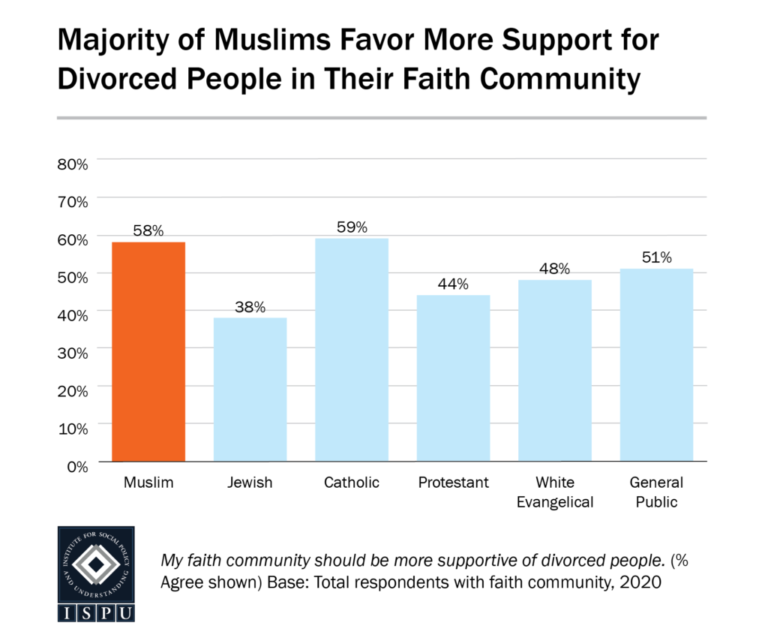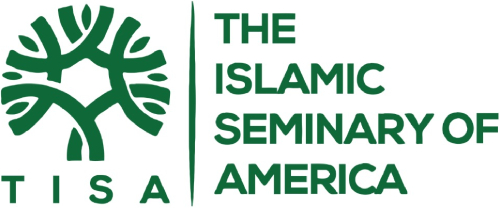This article is reshared from the Jan 2022 issue of Data Digest published by the Institute of social policy and understanding. The original article can be found here: 10 Areas of Need in American Muslim Communities | ISPU
5. RELATIONSHIPS: Creating educational and support programs related to marriage and family matters in Muslim spaces and addressing issues related to divorce and racism
Young Muslims are more accepting of divorce than their peers in the general public, and the majority of Muslims, especially young Muslims, would like more support for divorced individuals in their faith communities. Hence, community leaders and Muslim centers should consider creating relevant support and educational programs. While a majority (67%) of Muslims say they will accept their child marrying a divorced person, they are still less likely than the general public to accept a divorced spouse for their child. Hence, issues of stigma related to divorce and racism need to be addressed in Muslim communities. A barrier to seeking help is that marriage education and counseling is still not widely socially accepted in the American Muslim community and there can also be a divide between Imams and mental health workers on marital issues.
Five Surprising Facts about Divorce in American Muslim Communities
JANUARY 12, 2021 | BY DALIA MOGAHED
Long considered a taboo subject in the American Muslim community, divorce is a part of many Muslim families’ reality. Despite impacting millions of families, very little data is available on divorce among Muslims in America so the community conversations that do occur about the topic often lack grounding in empirical research. The Institute for Social Policy and Understanding (ISPU) seeks to fill this gap with the following analysis. This data is sourced from ISPU’s 2020 nationally representative survey, American Muslim Poll: Amid Pandemic and Protest, fielded in spring 2020. A full methodology is available here.
1. Compared to the general public, Muslims are equally likely to be married, but are less likely to be divorced.


How accepted is divorce among Muslims? The community is split, with a slight majority (54%) agreeing that “divorce is usually the best solution when a couple can’t seem to work out their marriage problems.” This phrasing is included in a standard question used by the CDC to measure social acceptance of divorce for decades. The public at large is also split, with 49% expressing agreement with this statement. It is interesting to note that Muslims (54%) are more likely than white Evangelicals (31%) to accept divorce, but less likely than Catholics (65%)–despite the fact that divorce is sanctioned in Islam but against the teachings of the Catholic Church.
Divorce remains a controversial topic with nearly equal portions of the Muslim community not accepting it as a solution to irreconcilable differences in a marriage. Divorced people will therefore likely continue to face stigma and judgement from large swaths of the community, but this is not unique to Muslims.
3. Muslim young people are of divorce than their generational peers in general public.more accepting

Though Muslims (54%) are slightly more likely than the general public (49%) to accept divorce, this difference is more pronounced when comparing across cohorts of 18-29 year olds in each group. While 51% of young Muslims (18-29 year olds) agree divorce is the best solution when a couple can’t seem to work out their marriage problems, only 40% of young people in the general population say the same. This was one of the most surprising results from the study.
What explains this trend? According to a major national survey published by the CDC and conducted among American adults over the past two decades, “From 2002 to 2011–2013, there was an increase in the percentages of men and women who agreed with premarital cohabitation, nonmarital childbearing, the right for gay and lesbian adults to adopt children, same-sex sexual relations, and premarital sex for those aged 18. There was a decrease in the percentages of men and women who agreed with divorce.”
It turns out that as public acceptance of alternatives to traditional marriage increases, tolerance for divorce decreases. Some anthropologists explain this trend among millennials, many who are the children of divorced parents, as young people delaying marriage and entering alternative relationships, while viewing marriage as more permanent. Less likely than the general public to engage in premarital relationships like cohabitation, young Muslims still are more likely to see marriage as the only acceptable way to meet their need for romantic and sexual companionship, and therefore view divorce as more acceptable when it doesn’t work out.
4. A majority of Muslims would like more support for divorced people in their faith community.

Roughly the same percentage of Muslims who accept divorce as a solution to unresolvable marital problems believe their faith community should be more supportive of divorced people. In fact, Muslims (58%) and Catholics (59%) are the most likely groups to desire improvements in how divorced people fare in their communities. This view is especially salient among young Muslims where 61% of 18-29 year olds hold this view compared to 46% of those 50 and older. Community leaders would do well to consider the views of the majority of Muslims when creating support programs and educational opportunities in their Muslim institutions.
5. Muslims are less likely than those in the general public, Jews, and those that consider themselves non-affiliated to accept a divorced person as a spouse for their child.

A majority of Muslims (67%) say they would accept their child marrying a divorced person, more likely than white Evangelicals, on par with Protestants and Catholics, but less likely than the general public, Jews, and non-affiliated Americans. This points to the enduring reality that divorce is stigmatized and divorced people are not fully accepted by a significant swath of society, and Muslims are no exception.
Dalia Mogahed is the Visiting Faculty at TISA and the Director of Research at the Institute for Social Policy and Understanding, where she leads the organization’s pioneering research and thought leadership programs on American Muslims. Learn more about Dalia→
Community Brief: Promoting Healthy Marriages & Preventing Divorce in the American Muslim Community
Recommendations for Promoting Healthy Marriages & Preventing Divorce in the American Muslim Community

